大学英语四六级,考研英语共35页文档
大学英语四六级与考研英语的关系与区别

大学英语四六级与考研英语的关系与区别一、考研英语与四、六级的联系毋庸置疑,考研英语与四六级确定是有很大差异的。
但是,在大谈特谈两者的差异之前,我们需要知道,两者有什么样的联系。
同为英语,四六级英语和考研英语必定有些地方是相通的,一起复习能够有所进步。
(1)词汇要求:考研词汇要求5500+的词汇,而六级的要求也是差不多的(当然四级要求少了1000左右)而从大纲的要求来看,六级词汇和考研词汇考察的基本上差不多,假如你有一本六级词汇了,基本上可以用来复习考研词汇了(2)考察英语运用力量:不管复习四六级还是考研英语,基础是相当关键的,比方在作文考试中,考察的就是你的语言表达力量,语句是否通顺,连接是否顺畅,这和英语的基础功底是分不开的。
基础不牢,地动山摇!不管复习考研英语还是四六级,在日常生活中都要注意基础的培育。
(3)作文方面:考研英语的大作文和四六级英语的写作题型,外表上看起来差距特别之大,但是,假如深化讨论其本质我们会发觉,考研英语作文的图画或图标作文,本质上来讲,还是一个话题作文,由于这些图画或图表,往往是反映一种社会现象或社会问题,需要考生从图画或图表中,提炼出图画图表所要表达的观点,再进行深化商量。
所以,除了第一段的图画或图标描述与四六级考试的作文有肯定差异,后面的段落内容与四六级考试的作文并没有本质上的区分。
(4)做题方法:无论是考研英语还是四六级考试,带着选项去做题都不失为一种好方法。
一般来讲,两种考试都是根据文章的挨次支配问题,定位精确后就可以在短时间内找到答案,。
当然,四六级英语和考研英语存在很大不同,考察侧重点也不一样,所以二者过与不过没有必定的联系。
二、考查目的的区分(1)考研面对的对象是报考讨论生的同学,而四六级是面对全部的高校生,因此前者的选拔目的更加突出,考查形式也更为敏捷,而四六级则更注意基础。
(2)考研英语和英语四六级是两种不同类型的考试,前者由教育部考试中心出题,后者由高校英语四六级考试委员会出题,出题的风格有很大区分。
英语考研四六级模板
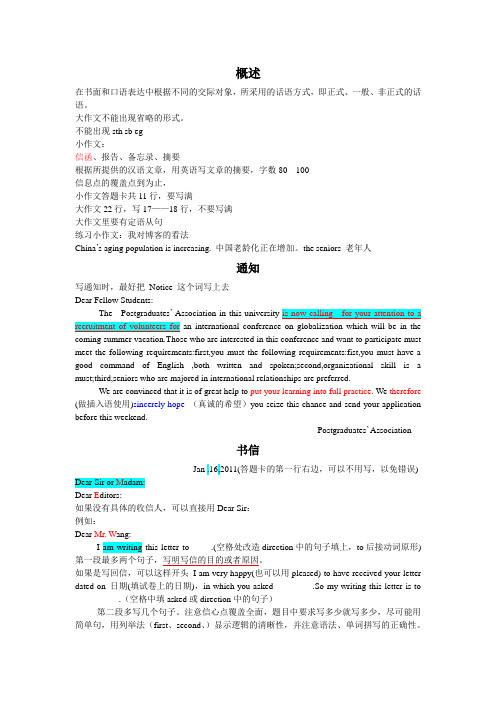
概述在书面和口语表达中根据不同的交际对象,所采用的话语方式,即正式、一般、非正式的话语。
大作文不能出现省略的形式。
不能出现sth sb eg小作文:信函、报告、备忘录、摘要根据所提供的汉语文章,用英语写文章的摘要,字数80---100信息点的覆盖点到为止,小作文答题卡共11行,要写满大作文22行,写17——18行,不要写满大作文里要有定语从句练习小作文:我对博客的看法China’s aging population is increasing. 中国老龄化正在增加。
the seniors 老年人通知写通知时,最好把Notice 这个词写上去Dear Fellow Students:an international conference on globalization which will be in the coming summer vacation.Those who are interested in this conference and want to participate must meet the following requirements:first,you must the following requirements:fist,you must have a good command of English ,both written and spoken;second,organizational skill is a must;third,seniors who are majored in international relationships are preferred.We are convinced that it is of great help to put your learning into full practice. We therefore (做插入语使用)sincerely hope(真诚的希望)you seize this chance and send your application before this weekend.Postgraduates’ Association书信Jan .16,2011(答题卡的第一行右边,可以不用写,以免错误) Dear Sir or M adam:Dear E ditors:如果没有具体的收信人,可以直接用Dear Sir:例如:Dear Mr. W ang:I am writing this letter to_____.(空格处改造direction中的句子填上,to后接动词原形)第一段最多两个句子,写明写信的目的或者原因。
四六级考研相关资料

一、试卷构成和成绩就所测试的语言能力而言,试点阶段的四级考试由以下四个部分构成:1)听力理解;2)阅读理解;3)完型填空或改错;4)写作和翻译。
听力理解部分分值比例为35%;其中听力对话15%,听力短文20%。
听力对话部分包括短对话和长对话的听力理解;听力短文部分包括选择题型的短文理解和复合式听写。
阅读理解部分分值比例为35%;其中仔细阅读部分(Reading in Depth)25%,快速阅读部分(Skimming and Scanning)10%。
仔细阅读部分分为:a)选择题型的篇章阅读理解;b)篇章层次的词汇理解(Banked Cloze)或短句问答(Short Answer Questions)。
快速阅读理解部分测试的是浏览阅读和查读能力。
完型填空或改错部分分值比例为10%。
完型填空部分采用多项选择题型,改错部分的要求是辨认错误并改正。
写作和翻译部分分值比例为20%;其中写作部分(Writing)15%,翻译部分(Translation)5%。
写作的体裁包括议论文、说明文、应用文等;翻译部分测试的是句子、短语或常用表达层次上的中译英能力。
一、题型分配:第一部分写作30分钟一道题目(占总分值15%)第二部分快速阅读15分钟十道题目,七个选择,三个填空(占总分值10%)[过去的对错判断改为了ABCD的选择题]第三部分听力理解35分钟(占总分值35%)A节11-18题短对话选择19-25题长对话选择B节26-35题段落理解B节听写第四部分仔细阅读25分钟(占总分值25%)A节回答问题与填空一篇文章五道题目B节传统阅读两篇文章十道题目第五部分完形填空/改错15分钟十道题目(占总分值10%)第六部分翻译5分钟五道题目(占总分值5%)二、考试题型及建议:一、阅读(占35%,含速读、精读和选词填空)在快速阅读的考前练习中,可以迅速浏览大小标题,了解文章的中心和文章整体的布局。
出题者常以依次而下的顺序出题,而且每题基本都是细节题,分别对应文章一段,可以采用关键词定位的方法。
四级六级考研英语作文范文

四级六级考研英语作文范文In the realm of English proficiency exams such as CET-4, CET-6, and postgraduate entrance exams, the essay sectionis often a critical component that determines the overall score. Given its significance, it's imperative tounderstand the structure, content, and language proficiency required for writing an impressive essay. This article aims to provide a comprehensive analysis of CET-4, CET-6, and postgraduate entrance exam essay templates, discussingtheir key features, common pitfalls, and strategies for effective essay writing.**1. Understanding the Essay Structure**The essay structure typically follows a three-paragraph format: introduction, body paragraphs, and conclusion.* **Introduction:** This paragraph introduces the topic and provides a brief overview of the essay's main ideas. It should be concise and engaging, drawing the reader's attention. * **Body Paragraphs:** These paragraphs developthe main ideas introduced in the introduction. Each paragraph should focus on a specific aspect of the topicand provide evidence or examples to support the argument. * **Conclusion:** The conclusion paragraph summarizes themain points and provides a closing argument or thought. It should leave a lasting impression on the reader.**2. Key Features of High-Scoring Essays*** **Clear and Coherent Arguments:** Essays should present a clear argument or position on the topic and provide evidence to support it. The arguments should be logical and well-organized, with each paragraph building upon the previous one. * **Variety of SentenceStructures:** Using a variety of sentence structures, such as simple, compound, and complex sentences, adds depth and complexity to the essay. This demonstrates the writer's command of the language. * **Effective Use of Language:** Essays should use precise vocabulary and avoid colloquialor informal language. The language should be clear, concise, and engaging, reflecting the writer's thoughtfulness and sophistication.**3. Common Pitfalls to Avoid*** **Vague Arguments:** Essays with vague or unsupported arguments are unlikely to score highly. It's essential to provide clear evidence or examples to support each point. * **Grammar and Spelling Mistakes:** Grammatical errors and spelling mistakes can significantly affect the readability and overall impression of an essay. Proofreading andediting are crucial to ensure a polished and professional final draft. * **Lack of Coherence:** Essays that lack a clear structure or flow are difficult to follow and understand. It's important to ensure that each paragraph builds upon the previous one, creating a logical and cohesive argument.**4. Strategies for Effective Essay Writing*** **Planning and Outlining:** Before starting the essay, it's helpful to plan and outline the main ideas and arguments. This helps organize the thoughts and ensures a logical flow of ideas. * **Practicing and Feedback:** Regular practice and feedback are essential for improving essay writing skills. Writing practice exams or essays on different topics and getting feedback from teachers orpeers can help identify areas for improvement. * **Revisingand Editing:** Revising and editing the essay after writing it helps identify and correct any grammar, spelling, or coherence issues. It's crucial to proofread the essay carefully before submitting it.In conclusion, writing a high-scoring essay for CET-4, CET-6, and postgraduate entrance exams requires a clear understanding of the essay structure, attention to language proficiency, and avoidance of common pitfalls. By planning and outlining the essay, practicing regularly, and revising and editing the final draft, candidates can significantly improve their essay writing skills and achieve better scores in these exams.**四级六级考研英语作文范文的深度解析与实战应用** 在诸如CET-4、CET-6以及研究生入学考试等英语水平考试中,作文部分往往是决定整体分数的关键。
四级六级英语考试
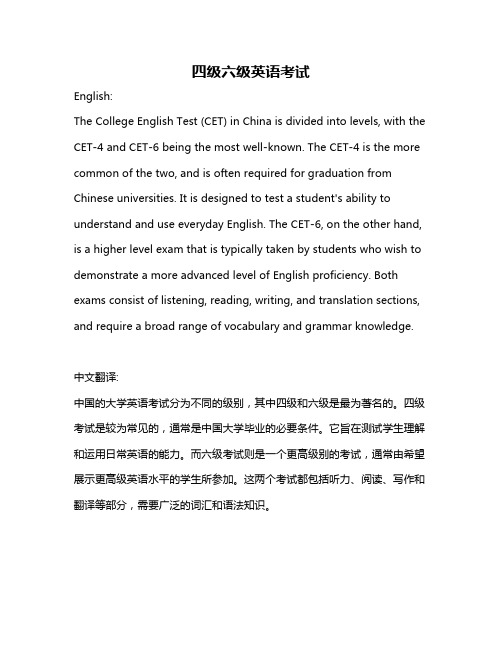
四级六级英语考试English:The College English Test (CET) in China is divided into levels, with the CET-4 and CET-6 being the most well-known. The CET-4 is the more common of the two, and is often required for graduation from Chinese universities. It is designed to test a student's ability to understand and use everyday English. The CET-6, on the other hand, is a higher level exam that is typically taken by students who wish to demonstrate a more advanced level of English proficiency. Both exams consist of listening, reading, writing, and translation sections, and require a broad range of vocabulary and grammar knowledge.中文翻译:中国的大学英语考试分为不同的级别,其中四级和六级是最为著名的。
四级考试是较为常见的,通常是中国大学毕业的必要条件。
它旨在测试学生理解和运用日常英语的能力。
而六级考试则是一个更高级别的考试,通常由希望展示更高级英语水平的学生所参加。
这两个考试都包括听力、阅读、写作和翻译等部分,需要广泛的词汇和语法知识。
大学英语四六级考试大纲
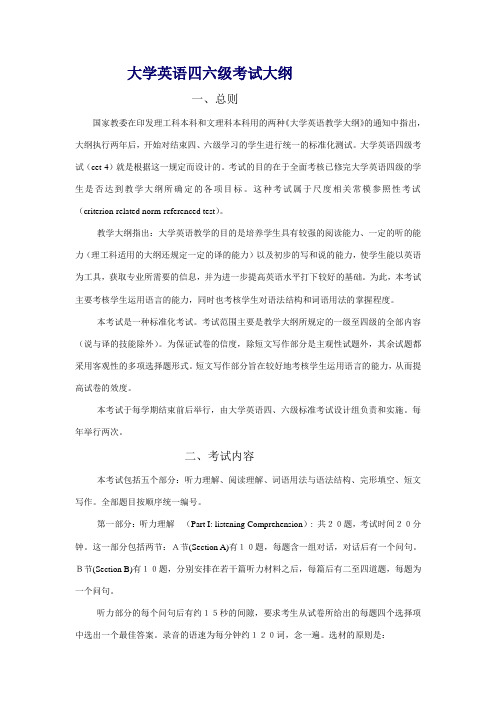
大学英语四六级考试大纲一、总则国家教委在印发理工科本科和文理科本科用的两种《大学英语教学大纲》的通知中指出,大纲执行两年后,开始对结束四、六级学习的学生进行统一的标准化测试。
大学英语四级考试(cet-4)就是根据这一规定而设计的。
考试的目的在于全面考核已修完大学英语四级的学生是否达到教学大纲所确定的各项目标。
这种考试属于尺度相关常模参照性考试(criterion-related norm-referenced test)。
教学大纲指出:大学英语教学的目的是培养学生具有较强的阅读能力、一定的听的能力(理工科适用的大纲还规定一定的译的能力)以及初步的写和说的能力,使学生能以英语为工具,获取专业所需要的信息,并为进一步提高英语水平打下较好的基础。
为此,本考试主要考核学生运用语言的能力,同时也考核学生对语法结构和词语用法的掌握程度。
本考试是一种标准化考试。
考试范围主要是教学大纲所规定的一级至四级的全部内容(说与译的技能除外)。
为保证试卷的信度,除短文写作部分是主观性试题外,其余试题都采用客观性的多项选择题形式。
短文写作部分旨在较好地考核学生运用语言的能力,从而提高试卷的效度。
本考试于每学期结束前后举行,由大学英语四、六级标准考试设计组负责和实施。
每年举行两次。
二、考试内容本考试包括五个部分:听力理解、阅读理解、词语用法与语法结构、完形填空、短文写作。
全部题目按顺序统一编号。
第一部分:听力理解(Part I: listening Comprehension): 共20题,考试时间20分钟。
这一部分包括两节:A节(Section A)有10题,每题含一组对话,对话后有一个问句。
B节(Section B)有10题,分别安排在若干篇听力材料之后,每篇后有二至四道题,每题为一个问句。
听力部分的每个问句后有约15秒的间隙,要求考生从试卷所给出的每题四个选择项中选出一个最佳答案。
录音的语速为每分钟约120词,念一遍。
考研英语和英语四六级考试哪个难

考研英语和英语四六级考试哪个难首先,咱们从性质上讲。
同学们基本上都考过大学英语四六级,但是,很少有人知道它们的具体含义,考就考了,为了拿个证书而已,不知道自己在考什么。
其实,大学四级是全日制在校本科生第四个学期应该达到的英语教学要求,即大二的第二个学期;大学六级是全日制在校本科生第六个学期应该达到的英语教学要求,即大三的第二个学期。
它们被称为是水平测试,换句话,也就是说,同学们只要过了这条线,就能拿到证书了。
但考研英语却不一样,不是说过来这条线就可以的,而是需要跟人家争得头破血流的,千万马过独木桥,必然存在非常高的淘汰率。
因此,考研英语被称为是一场选拔性的考试。
其次,我们从同学们最关注的的词汇上进行分析。
大学六级的词汇量其实和考研英语是相似的,都是5500。
但大学六级,只考这个单词的第一意义或常用意义,只要大家背了考纲的词汇表就没问题了。
而考研英语,往往更注重这部分词汇的熟词生义,一些中学词汇的新用法都能考得一塌糊涂。
比如举个最简单的例子:“As injury claims continue as before, some courts are beginning to side with defendants.”这句真题例句中,有个单词叫“claim”。
很明显,在这里“claim”作的是名词。
同学们对于这个单词,往往还停留在四六级的层面,多数人只知道它的一层意思,叫“声称、声明”。
但是很明显,“声称、声明”在这里行不通了。
这时候同学们得知道,其实,“claim”这个单词,在考研英语中共有三层意思,分别是“声称、声明”,“要求”,“索赔”。
在这里,很明显“索赔”更为恰当。
那么,整句话的意思就不难理解了,意思是“虽然伤残索赔仍然像之前一样在继续,但是一些法庭开始站在了被告方。
”这个小小的例子就告诉同学们,考研英语对单词的考察量以及考察角度,是有更高要求的。
从以上两个层面的分析,相信同学们已经明白,大学四六级和考研英语有着不小的差别。
英语四级考研试题及答案

英语四级考研试题及答案### English Level 4 Postgraduate Entrance Examination: Sample Questions and Answers#### Section A: Listening ComprehensionPart I: Short Conversations1. Question: What is the man likely to do?- Answer: He is likely to go to the library to return some books.2. Question: What does the woman mean?- Answer: The woman means that she will meet the man at the entrance of the cinema.3. Question: Why is the man upset?- Answer: The man is upset because he missed the last bus.4. Question: What is the woman's suggestion?- Answer: The woman suggests that they should take a taxi.Part II: Long Conversations1. Question: What are the speakers mainly discussing?- Answer: They are mainly discussing the upcoming project deadline.2. Question: What does the woman think of the man's idea?- Answer: The woman thinks the man's idea is creative but needs more research.3. Question: What is the man's plan for the weekend?- Answer: The man plans to work on the project over the weekend.4. Question: What does the woman agree to do?- Answer: The woman agrees to help the man with the project.#### Section B: Reading ComprehensionPassage 1:1. Question: What is the main idea of the passage?- Answer: The main idea of the passage is the importanceof time management for students.2. Question: According to the author, why do students often feel stressed?- Answer: Students often feel stressed because they havetoo many assignments and exams to prepare for.3. Question: What does the author suggest to deal with stress? - Answer: The author suggests creating a study scheduleand taking breaks to deal with stress.Passage 2:1. Question: What is the purpose of the passage?- Answer: The purpose of the passage is to introduce the benefits of regular exercise.2. Question: How does the author describe the effects of exercise on the body?- Answer: The author describes the effects of exercise as improving cardiovascular health and boosting energy levels.3. Question: What is the author's recommendation for incorporating exercise into daily life?- Answer: The author recommends finding an enjoyable activity and setting aside time for it regularly.#### Section C: Vocabulary and Grammar1. Question: The word "elaborate" in the sentence means:- Answer: To give more details or explain something in depth.2. Question: Which sentence has the correct use of the subjunctive mood?- Answer: "I suggest that he study harder."3. Question: The phrase "break down" in the context of a car means:- Answer: To stop functioning due to a mechanical failure.4. Question: Which sentence is grammatically correct?- Answer: "She has been working on the project for two hours."#### Section D: WritingTask: Write an essay on the importance of environmental protection.Essay:Environmental protection is a critical issue that affectsevery aspect of our lives. The degradation of the environment leads to a loss of biodiversity, climate change, and health problems for humans. It is essential to implement sustainable practices to reduce pollution, conserve natural resources, and protect ecosystems. Governments, businesses, and individuals all have a role to play in promoting environmental awareness and taking action to preserve our planet for future generations. By doing so, we can ensure a healthier and more sustainable world.This sample examination content is designed to provide an overview of the types of questions and the format of an English Level 4 Postgraduate Entrance Examination. It is important for test-takers to practice regularly and familiarize themselves with the structure and content of the exam to achieve success.。
四六级写作讲义考研资料

四六级写作讲义一、大纲解读1.四级大纲要求学生能用英语描述个人经历、观感、情感和发生的事件等;能描述简单的图表和图画,能就熟悉的主题发表个人观点;能写常见的应用文;能根据提纲、图表或图画等提示信息作简短的讨论、解释和说明。
中心思想明确,结构基本完整,用词较为恰当,语句通顺,语义连贯,能运用基本的写作策略。
能在半个小时内写出不少于120词的短文。
2.六级大纲要求考生能用英语就一般性的主题发表个人观点;描述图表和图画;能根据提纲、图表或图画等提示信息作较为深入的讨论、解释和说明。
观点明确,结构清晰完整,用词贴切,语言表达流畅,语意连贯,能较好地运用写作策略。
能在半小时内写出不少于150词的短文。
3.阅卷规则档次描述14分档切题,表达思想清楚,文字通顺,连贯,基本无语言错误,仅有个别小错(不多于3个)11分档切题,表达思想清楚,文字连贯,但有少量语言错误8分档基本切题,有些地方表达不清楚,文字勉强连贯,语言错误相当多,其中有一些是严重错误5分档基本切题,表达思想不清楚,连贯性差,有较多严重错误2分档条理不清,思维混乱,语言支离破碎,大部分句子有错误,且多为严重错误4.高分特点字数达标、格式正确逻辑合理、层次分明语法正确、不乏亮点层次感:To begin with,to start with,first and foremost,in the first placemore,furthermore,additionally,plus,likewise Moreover,what’sStill,last but not the least,what can neverbe neglectedis that 笔记:二、应用文应用文只有在四级考试中才会出现,且概率不高。
考生可把以下考点背会,融会贯通。
应用文本身就不可能写得很长,无需过度担心字数,所以能到达120左右即可。
(一)信件1.信件框架信头引言——2句……………………表明身份/立场——表明来意主体——4句……………………主题句——分论点1,2,3结尾——2句……………………总结句——套话信尾共同点:信头左顶格,通常是“Dear/You EsteemedXx”,其后接逗号。
大学英语四六级PPT课件

Writing and Translation
准确表达思想
在写作和翻译部分,考生需要准确表 达自己的思想,做到语言流畅、逻辑 清晰。可以通过审题、构思、草拟提 纲以及反复修改来提高表达的准确性。
Writing and Transla生需要掌握英语的 基本语言结构,包括句子结构、时态、语态 等。可以通过学习语法规则、积累词汇以及
reading comprehension
推理判断
在阅读理解部分,考生需要根据文章提供的信息进行推理判断,推断出隐含的意义和结论。可以通过 分析文章中的逻辑关系、上下文语境以及作者的观点态度来进行推理判断。
Listening comprehension
捕捉关键信息
在听力理解部分,考生需要快速捕捉关键信息,理解听力材 料的主要内容。可以通过关注听力材料的开头和结尾、定位 关键信息和筛选无关信息来捕捉关键信息。
don't miss any key information.
Common question types and problem-solving techniques
Multiple choice
Use elimination techniques to narrow down the answer choices.
• Analysis: The model test is used to familiarize students with the exam format and provide feedback on areas where they need to improve.
Simulated test questions and analysis Model Test
考研英语和英语四六级有什么区别 英语六级和考研英语哪个难

考研英语和英语四六级有什么区别英语六级和考研
英语哪个难
有不少同学都有着考研英语难度比英语四六级高的这种认知,可是其实呢,这两者并不能同一而论,两种英语考试的不同点很多,并不能仅仅以难度来进行表面区分。
下面小编跟大家说说考研英语和英语四六级有什幺区别,英语六级和考研英语哪个难,希望对你有帮助。
考研英语和英语四六级有什幺区别--二者定义并不同 英语四六级考试是教育部主管的一项全国性的英语考试,其目的是对大学生的实际英语能力进行客观、准确的测量,为大学英语教学提供测评服务。
在考试内容和形式上,四、六级考试将加大听力理解部分的题量和比例,增加快速阅读理解测试,增加非选择性试题的比例。
小编推荐:2018年考研英语后期复习规划建议而硕士研究生教育按照培养目标的不同,分为学术型研究生和专业学位研究生。
学术型研究生的培养目标是高层次学术研究型专门人才,专业学位研究生的培养目标是具有扎实理论基础,并适应特定行业或职业实际工作需要的应用型高层次专门人才。
具有较强的解决实际问题的能力,能够承担专业技术或管理工作,具有良好的职业素养的高层次应用型专门人才。
考研英语和英语四六级有什幺区别--题型不同 英语四六级题型包括听力、阅读、翻译、写作,其中的语言材料长难句虽然还是很多,但是努力练习就没问题;考研英语的题型包括完形填空、阅读、新题型、翻译和写作,语言材料多为长难句,会较为复杂,但是跟英语四六级相比,它最大的好处就是没有听力的考查,这对于习惯应试教育的同学们而言无疑是一个好消息。
当然,考研中还增加了一个新题型,更注重考查考生的思维逻辑能力。
考研四六级试题及答案
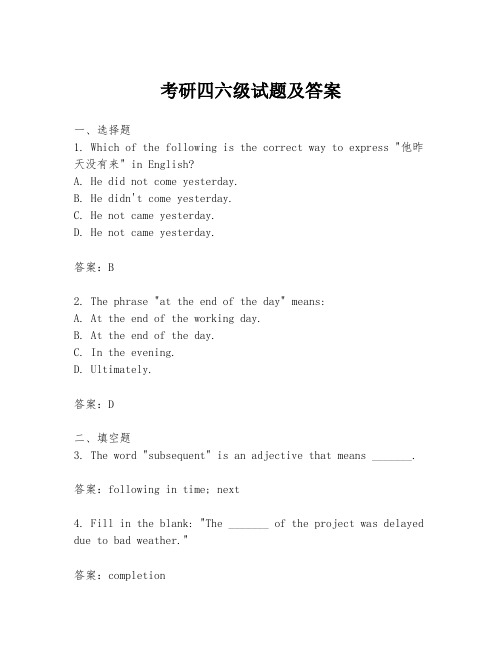
考研四六级试题及答案一、选择题1. Which of the following is the correct way to express "他昨天没有来" in English?A. He did not come yesterday.B. He didn't come yesterday.C. He not came yesterday.D. He not came yesterday.答案:B2. The phrase "at the end of the day" means:A. At the end of the working day.B. At the end of the day.C. In the evening.D. Ultimately.答案:D二、填空题3. The word "subsequent" is an adjective that means _______.答案:following in time; next4. Fill in the blank: "The _______ of the project was delayed due to bad weather."答案:completion三、阅读理解5. Read the following passage and answer the question: (Passage omitted for brevity)According to the passage, what was the main reason for the delay of the project?答案:The passage would need to be provided to answer this question.四、翻译题6. Translate the following sentence from English to Chinese: "The company has decided to invest in new technologies to improve its productivity."答案:该公司已决定投资新技术以提高其生产力。
【高中英语】考研英语与四六级的区别

【高中英语】考研英语与四六级的区别准备考研的同学大部分都考过英语四、六级,那么是英语六级难还是考研英语难,有些同学英语六级考了560分,但考研只得了50分,有些同学本科是英语专业过了专业八级,但考研也只得56分,究其原因,是因为英语四、六级与考研英语是完全不同的两个体系的考试。
四、六级是资格考试,只要能达到了一定的水平就能得高分。
而考研英语是筛选性的考试,每年国家招的人数是有限制的,因此国家会利用英语这门考试筛选一部分人。
考研英语与六级考试有四点不同。
【一】考题不同。
考研的题型有完型、传统阅读、新题型、翻译、作文。
其中完型由280个单词构成,给出20个空,每空2.5分,共10分,这道题全国的均分是2.5-3.5分,此题考查同学们的词组搭配,语法和语感能力。
传统阅读由4篇文章构成,每篇文章400个单词,5个问题,每题2分,一共20个问题,共计40分。
新题型是国家取消研究生入学考试听力以后新加的题型,此题来源于博士研究生入学考试的题型。
翻译是平衡整张试卷难度的。
如果前面出的题难就会出2个长难句,3个简单句;如果前面的题简单,此题就会出3个长难句2个简单句。
建议大家把真题中的阅读认真翻译一遍,真题阅读是翻译的好的范本。
作文由一篇小作文和一篇大作文构成,其中小作文10分,要求写一篇100个单词的应用文,大作文20分,要求写一篇160-200个单词的议论文,万学海文有一个超级作文模版,此模版用哲学的观点把世间万物分为4类,此模版把一篇作文变成了一个填空题,只要大家把议论的事物填进去,便可得一个很好的分数。
【二】单词评估的重点是不同的四、六级考试一般考单词的前一两个常用的意思,而考研英语考单词的最后两个意思。
2021年研究生入学考试英语作文题讲得是赡养老人的问题,赡养这个单词很多同学都不会写,其实很简单就用support,可能大家只知道support有支持,提供的意思,但忘记了它还有赡养的意思。
【三】语法考试的重点是不同的四、六级考试重点考核词法,如名词、动词、形容词、介词等等,而考研英语侧重考核语法,如宾语从句、状语从句、倒装句等等。
四六级英语作文和考研英语作文

四六级与考研英语作文的差异与备考策略 English proficiency exams, such as CET-4, CET-6, and postgraduate entrance exams, are crucial milestones in the academic journey of Chinese students. Among these exams, the writing section holds a significant position, testing students' ability to express their thoughts and ideas in English effectively. However, there are distinct differences between the writing requirements of CET-4/6 and postgraduate entrance exams, necessitating different preparation strategies.Firstly, the scope and depth of the topics vary significantly. CET-4 and CET-6 essays often focus on more general and daily-life related topics, such as the importance of reading, the challenges of modern life, or the influence of technology on society. These topics are designed to assess students' basic writing skills andability to express opinions coherently. In contrast, postgraduate entrance exam essays tend to delve deeper into more academic and specialized areas, requiring a more in-depth analysis and critical thinking. Topics might include social issues, cultural differences, or economic trends,which require a more sophisticated understanding and a more rigorous approach to writing.Secondly, the writing style and format also differ. CET-4 and CET-6 essays tend to be more descriptive and narrative in nature, emphasizing clear and concise expression. Students are expected to present their ideas in a logical and organized manner, with a focus on language fluency and grammar accuracy. On the other hand, postgraduate entrance exam essays often require a more analytical and argumentative approach. Students are not only expected to present their opinions but also to justify them with evidence and reasoning, demonstrating a highlevel of critical thinking and analysis.Lastly, the time allocation and length of the essays also vary. CET-4 and CET-6 essays are typically shorter and require less time to complete, allowing students to focus more on the content and language usage. However, postgraduate entrance exam essays are often longer and require more time to develop a coherent and comprehensive argument. This means that students need to plan their timeeffectively and ensure that they have enough time to revise and refine their essays.Given these differences, it is crucial for students to adopt different preparation strategies for CET-4/6 and postgraduate entrance exam essays. For CET-4 and CET-6, students should focus on improving their basic writing skills, such as sentence structure, grammar, and vocabulary. They can practice writing essays on various topics and seek feedback from teachers or peers to identify and correct any weaknesses. Additionally, reading and understanding model essays can help students familiarize themselves with the structure and format of the essays.For postgraduate entrance exams, students need to go beyond the basics and develop their critical thinking and analysis skills. They should read widely and deeply intheir chosen field, understanding different perspectivesand arguments. This will help them develop a more nuanced understanding of the topics and enable them to presenttheir opinions with evidence and reasoning. Additionally, students should practice writing longer and more complexessays, ensuring that their arguments are well-structured and coherent.In conclusion, the writing section of CET-4/6 and postgraduate entrance exams poses different challenges and requires different preparation strategies. By understanding the scope and depth of the topics, the writing style and format, and the time allocation, students can tailor their preparation accordingly and improve their chances of success in these exams.**四六级与考研英语作文的差异与备考策略**四六级和考研英语考试是中国学生学术旅程中的重要里程碑。
非全日制研究生英语四六级
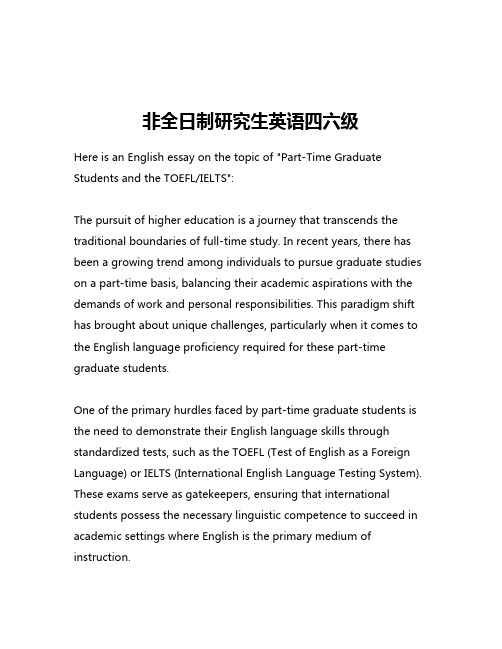
非全日制研究生英语四六级Here is an English essay on the topic of "Part-Time Graduate Students and the TOEFL/IELTS":The pursuit of higher education is a journey that transcends the traditional boundaries of full-time study. In recent years, there has been a growing trend among individuals to pursue graduate studies on a part-time basis, balancing their academic aspirations with the demands of work and personal responsibilities. This paradigm shift has brought about unique challenges, particularly when it comes to the English language proficiency required for these part-time graduate students.One of the primary hurdles faced by part-time graduate students is the need to demonstrate their English language skills through standardized tests, such as the TOEFL (Test of English as a Foreign Language) or IELTS (International English Language Testing System). These exams serve as gatekeepers, ensuring that international students possess the necessary linguistic competence to succeed in academic settings where English is the primary medium of instruction.For part-time graduate students, the challenge of preparing for and excelling in these language proficiency tests can be daunting. Many of these individuals are already juggling the demands of full-time employment, family commitments, and their academic pursuits, leaving limited time and energy for dedicated language study. The stress of balancing these competing priorities can be overwhelming, potentially hindering their ability to focus on the nuances of English and achieve the desired test scores.Moreover, the format and structure of the TOEFL and IELTS exams can be quite different from the everyday language skills required in professional or personal settings. Part-time graduate students may be proficient in conversational English, but the academic vocabulary, complex grammar structures, and specialized test-taking strategies needed for these exams can present significant challenges.To address these barriers, part-time graduate students must adopt a strategic and disciplined approach to their language preparation. This may involve seeking out specialized language training programs, utilizing online resources and practice materials, or engaging in peer-to-peer learning and support networks. By leveraging these resources and developing a comprehensive study plan, part-time graduate students can enhance their chances of success in the TOEFL or IELTS exams.Additionally, institutions offering part-time graduate programs can play a crucial role in supporting their students' language development. By providing access to language tutoring services, organizing targeted workshops, or integrating language proficiency training into the curriculum, these institutions can help bridge the gap between the students' existing language skills and the requirements of the standardized tests.Beyond the immediate hurdle of the TOEFL or IELTS, part-time graduate students must also contend with the ongoing need to maintain and improve their English language proficiency throughout their academic journey. As they delve deeper into their field of study, they may encounter increasingly complex academic discourse, research papers, and presentations that demand a high level of linguistic competence.To navigate this challenge, part-time graduate students must cultivate a lifelong learning mindset, continuously seeking opportunities to enhance their English language skills. This may involve reading scholarly publications in their field, engaging in discussions with faculty and peers, or even exploring opportunities to present their research at academic conferences.By embracing this holistic approach to language development, part-time graduate students can not only succeed in their TOEFL or IELTSexams but also positioning themselves for long-term academic and professional success. The ability to effectively communicate in English, both in written and oral form, is a critical asset that can open doors to collaborative research, international networking, and the dissemination of knowledge.In conclusion, the challenge of navigating the TOEFL or IELTS exams for part-time graduate students is a multifaceted one, requiring a combination of strategic planning, dedicated effort, and institutional support. By overcoming these hurdles, part-time graduate students can not only fulfill the language proficiency requirements but also develop the linguistic skills necessary to thrive in their academic and professional pursuits. The journey may be arduous, but the rewards of successful language mastery can be truly transformative, empowering these part-time students to make meaningful contributions to their fields of study and the global community.。
四六级英语作文和考研英语作文
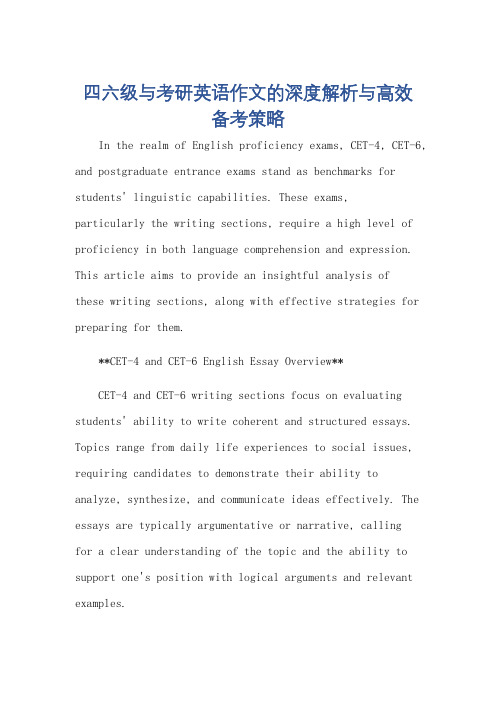
四六级与考研英语作文的深度解析与高效备考策略In the realm of English proficiency exams, CET-4, CET-6, and postgraduate entrance exams stand as benchmarks for students' linguistic capabilities. These exams,particularly the writing sections, require a high level of proficiency in both language comprehension and expression. This article aims to provide an insightful analysis ofthese writing sections, along with effective strategies for preparing for them.**CET-4 and CET-6 English Essay Overview**CET-4 and CET-6 writing sections focus on evaluating students' ability to write coherent and structured essays. Topics range from daily life experiences to social issues, requiring candidates to demonstrate their ability to analyze, synthesize, and communicate ideas effectively. The essays are typically argumentative or narrative, callingfor a clear understanding of the topic and the ability to support one's position with logical arguments and relevant examples.**Postgraduate Entrance Exam English Essay Overview** The English essay section of the postgraduate entrance exam is often more demanding, focusing on critical thinking and academic writing. Topics are often more specialized and require a deeper understanding of the subject matter. The essays demand a high level of language proficiency, with a focus on clarity, coherence, and academic rigor. Candidates are expected to demonstrate their ability to conduct independent research, analyze complex issues, and present their findings in a structured and persuasive manner.**Strategies for Effective Preparation**1. **Understanding the Exam Format and Requirements**: Familiarize yourself with the exam format, including the type of essay, word count, and scoring criteria. This will help you to plan your writing strategy and ensure that your essay meets the required standards.2. **Practicing with Sample Essays**: Analyze and practice writing sample essays from previous exams. This will help you familiarizeyourself with the types of topics and questions that may appear on the exam, as well as develop your writing skills and speed. 3. **Expanding Your Vocabulary and GrammarSkills**: A rich vocabulary and strong grammar skills are essential for writing coherent and error-free essays. Make sure to review and practice vocabulary and grammar regularly. 4. **Developing Logical Arguments and Analytical Skills**: Practice writing essays that require you to analyze and argue a position. This will help you develop the ability to think critically and present your ideas in a logical and coherent manner. 5. **Practicing Time Management**: The writing section of these exams can be time-consuming. Practice writing essays within the allotted time to ensure that you can complete your essay within the given time limit.In conclusion, preparing for the writing sections of CET-4, CET-6, and postgraduate entrance exams requires a combination of strategic planning, regular practice, and a focus on improving language proficiency. By following these tips and strategies, candidates can increase their chances of scoring well on these exams and demonstrating their English proficiency effectively.**四六级与考研英语作文的深度解析与高效备考策略**在英语水平考试中,四六级和考研英语作为衡量学生语言能力的重要标准,其写作部分尤为关键。
英语46级和考研英语

英语46级和考研英语1. achievement (46级) / accomplishment (考研) - She was proud of her achievement/accomplishment in winning the competition.她为自己在比赛中获胜的成就感到自豪。
2. analysis (46级) / examination (考研) - The scientist conducted a detailed analysis/examination of the data.科学家对数据进行了详细的分析。
3. collaborate (46级) / cooperate (考研) - The team members collaborated/cooperated closely to complete the project on time.团队成员紧密合作,按时完成了这个项目。
4. debate (46级) / argue (考研) - They engaged in a lively debate/argument about the benefits of technology.他们就科技的好处展开了一场热烈的辩论。
5. determine (46级) / decide (考研) - The investigation will determine/decide the cause of the accident.调查将确定这起事故的原因。
6. emphasize (46级) / stress (考研) - The speaker emphasized/stressed the importance of effective communication in the workplace.演讲者强调了有效沟通在工作场所的重要性。
7. facilitate (46级) / enable (考研) - The new software will facilitate/enable faster data processing.这个新软件将使数据处理更快。
- 1、下载文档前请自行甄别文档内容的完整性,平台不提供额外的编辑、内容补充、找答案等附加服务。
- 2、"仅部分预览"的文档,不可在线预览部分如存在完整性等问题,可反馈申请退款(可完整预览的文档不适用该条件!)。
- 3、如文档侵犯您的权益,请联系客服反馈,我们会尽快为您处理(人工客服工作时间:9:00-18:30)。
39、没有不老的誓言,没有不变的承 诺,踏 上旅途 ,义无 反顾。 40、对时间的价值没有没有深切认识 的人, 决不会 坚韧勤 勉。
61、奢侈是舒适的,否则就不是奢侈 。——CocoCha nel 62、少而好学,如日出之阳;壮而好学 ,如日 中之光 ;志而 好学, 如炳烛 之光。 ——刘 向 63、三军可夺帅也,匹夫不可夺志也。 ——孔 丘 64、人生就是学校。在那里,与其说好 的教师 是幸福 ,不如 说好的 教师是 不幸。 ——海 贝尔 65、接受挑战,就可以享受胜利的喜悦 。——杰纳勒 尔·乔治·S·巴顿
